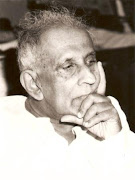

Rev. Dr. Simon Samuel
(Renowned postcolonial biblical scholar and principal, New Theological College, Dehradun. He has authored the book, A Postcolonial Reading of Mark's Story of Jesus, 2007, London & New York: T&T Clark)
Wednesday 3 June 2009, 2.00 pm
at Pennamma Bhavanam
The lecture and discussion was chaired by Rev. Dr. M.C. Thomas (Professor and OT Scholar, M.T. Seminary, Kottayam). In his presidential speech he introduced the term hermeneutics and different stages of the development of biblical hermeneutics. There was a radical shift in the biblical hermeneutics in the 1950s. It was the historical-critical method that was predominant until the 1950s. This method looked behind the text for its author’s intentions. This method was challenged in the 1950s and after, since the emergence of postmodern trends in hermeneutics.
The Postcolonial readings of the bible was part of this new trend. Edward Said (Orientalism) and Franz Fanon (Wretched of the Earth) were the two major influences on the postcolonial interpretative method. It was after 1990s the postcolonial reading of the bible became a major trend. The basic assumption of postcolonial biblical hermeneutics is that most of the texts in the bible are written in the context of imperialisms and are responses to the colonisation. As we live in the context of new manifestations of imperialism/colonialism today, the postcolonial method of interpretation can open us towards new possibilities of reading the bible, Rev. Dr. M.C. Thomas Pointed out.
Rev. Dr. Simon Samuel pointed out in his lecture that 3/4th of the people in the world have the experience of imperialism, and their culture and life are shaped by the colonial experience. We are also under a psychological colonialism (colnisation of the mind) along with its material manifestations. Colonialism occurred in two ways: there was a colonialism from outside (by the white colonial master) and from inside (by the native breed of masters). Postcolonialism addresses and engages with both the discourses. Postcolonialism is a critical practice of discourse analysis that critically analyses the complexities of the dynamics of the engagement between the indigenous people with the colonialists.
The prefix, “post” in postcolonialism does not refer to polarity or denote ‘after’. On the contrary, the ‘post’ refers to a spatial category: a space between colonial master and the colonised subjects. This ‘third space’ that emerged after colonialism provides the tools for ‘dismantling the house of the colonial master’. Therefore it is an emancipatory space for the colonial subjects. It is a new space for politics.
Postcolonialism is a mini-narrative and a meta-narrative at the same time. As a mini narrative, it is grounded in the specificities of the loci of the discourse. That is, it seriously acknowledges the context specificity of the text: it does not completely discard the historical-critical method, although it is a poststructuralist method. It is a meta- narrative, as it positively professes to achieve a universal liberation hermeneutics: that is, postcolonialism offers heterogeneity in critical practice and homogeneity in its ambition for universal liberation hermeneutics.
The revisionist Marxism of Gramsci (Prison Notebooks), Althusser (On Lenin and Other Essays) etc. as well as poststructuralists like Edward Said (Orientalism & Culture and Imperialism), Homi K. Bhabha (Location of Culture) and Gayathri Chakravarthy Spivak (‘Can the Subaltern Speak?’) provide inspiration and theoretical resources for postcolonialism.
There are four models in postcolonial biblical hermeneutics: The first one is the essentialist-nativist model (ex. Lara Donaldson’s works) that locates the native space as a sacred space. It replaces the imperial master with the native master instead of displacing of the mastery itself. The second model is the resistance-recuperative model (ex. writings of R.S. Sugatharaj). This is very similar to the liberation theology model with a sudden polarisation. On the contrary, the diasporic–subcultural model, which is the third one, has got the liberative component neutralised. There is a high level of sub-cultural homogenisation professed by this model. The heterogeneity of the community was underestimated and there is extreme polyglottism in this model; the universal liberation hermeneutic goal is completely absent in this perspective. Dalit theology and liberation theology in its contemporary form are examples for this model. The Fourth model which transcends the problems and inadequacies of the previous models is the strategic essentialist-transhybridity model, which is subscribed by Rev. Dr. Simon Samuel.
This model emphasises the emancipation of both the colonial master and the native subject by transforming their repressive identities. There is great willingness to accept the other and there is little demarcation between the self and the other. The community in Mark’s gospel positioned themselves between the Roman Empire and Jewish native space and thereby they engaged with, disturbed and dislocated both the colonial spaces of power. Therefore, the Markian gospel has to be read neither as an imperialist text, nor an anti-imperialist one (like the reading in Chedmayer: Binding the Strongman). Instead it can be understood as representing the third space created by the Markian community, a text that helps dismantling both the houses of the colonial and native masters.
There were 30 participants in the programme. Most of them were theological students, research scholars, priests and laypersons who are interested in biblical hermeneutics. Mr. Jobi Mathew welcomed everybody and Shiju Sam Varughese delivered the vote of thanks.






.jpg)






No comments:
Post a Comment
Thank you very much for responding to the post. Please keep in touch in future also.